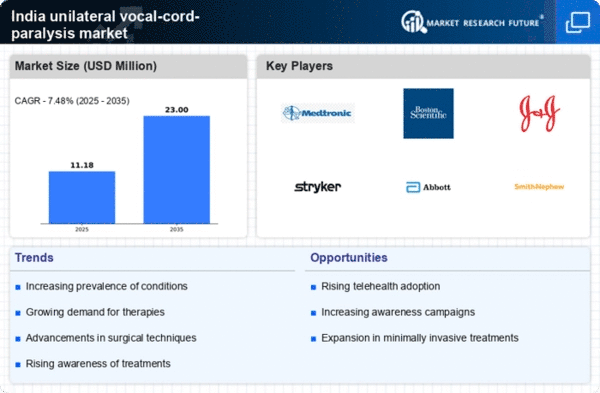Increased Healthcare Expenditure
Increased healthcare expenditure in India is a significant driver for the unilateral vocal-cord-paralysis market. With the government and private sectors investing more in healthcare infrastructure, there is a growing availability of advanced diagnostic and treatment options for vocal cord disorders. The healthcare expenditure in India has been rising steadily, reaching approximately 3.5% of GDP, which facilitates better access to specialized care. This financial commitment is likely to enhance the capabilities of healthcare providers to offer innovative treatments for unilateral vocal cord paralysis. Consequently, as more patients gain access to quality healthcare services, the unilateral vocal-cord-paralysis market is poised for substantial growth.
Rising Awareness of Vocal Health
Rising awareness of vocal health among the Indian population is emerging as a key driver for the unilateral vocal-cord-paralysis market. Educational campaigns and initiatives by healthcare organizations are increasingly informing the public about the importance of vocal hygiene and the potential consequences of vocal cord disorders. This heightened awareness is leading to earlier diagnosis and treatment, which is crucial for effective management of unilateral vocal cord paralysis. As individuals become more proactive about their vocal health, the demand for medical consultations and therapeutic interventions is likely to increase. This trend suggests a positive outlook for the unilateral vocal-cord-paralysis market as it adapts to the evolving needs of a more informed patient population.
Advancements in Surgical Techniques
Recent advancements in surgical techniques for treating unilateral vocal cord paralysis are significantly influencing the unilateral vocal-cord-paralysis market. Innovations such as minimally invasive procedures and the use of robotic-assisted surgeries have improved patient outcomes and reduced recovery times. For instance, techniques like vocal cord injection and thyroplasty are gaining traction among otolaryngologists, leading to higher success rates in restoring vocal function. The market is projected to grow as more healthcare facilities adopt these advanced surgical methods, enhancing the overall treatment landscape. Additionally, the increasing training and expertise among surgeons in these techniques may further drive the demand for surgical interventions in the unilateral vocal-cord-paralysis market.
Increasing Incidence of Vocal Cord Disorders
The rising incidence of vocal cord disorders in India is a crucial driver for the unilateral vocal-cord-paralysis market. Studies indicate that approximately 3-5% of the population may experience some form of vocal cord dysfunction, with a notable increase in cases attributed to environmental factors and lifestyle changes. This growing prevalence necessitates enhanced medical attention and treatment options, thereby expanding the market. Furthermore, the increasing number of patients seeking medical intervention for voice-related issues is likely to stimulate demand for specialized therapies and surgical procedures. As healthcare providers become more aware of the complexities associated with vocal cord disorders, the unilateral vocal-cord-paralysis market is expected to witness significant growth, driven by the need for effective management solutions.
Growing Demand for Voice Rehabilitation Services
The growing demand for voice rehabilitation services in India is a notable driver for the unilateral vocal-cord-paralysis market. As awareness of the importance of vocal health increases, more patients are seeking specialized rehabilitation programs to regain their voice quality post-treatment. This trend is supported by the rising number of speech therapists and rehabilitation centers focusing on vocal cord disorders. Market data suggests that the voice therapy segment is expected to grow at a CAGR of around 8-10% over the next few years. This growth indicates a shift towards comprehensive care that includes not only medical treatment but also rehabilitation, thereby expanding the unilateral vocal-cord-paralysis market.
















